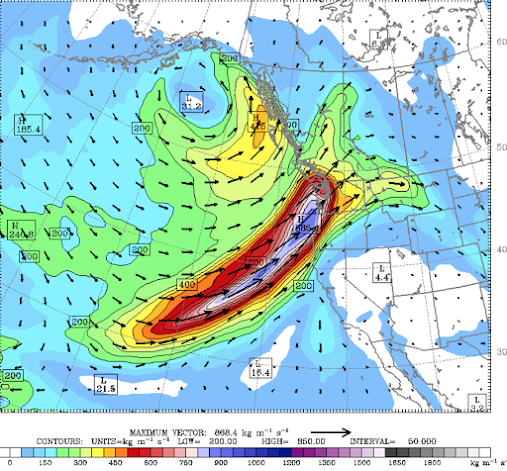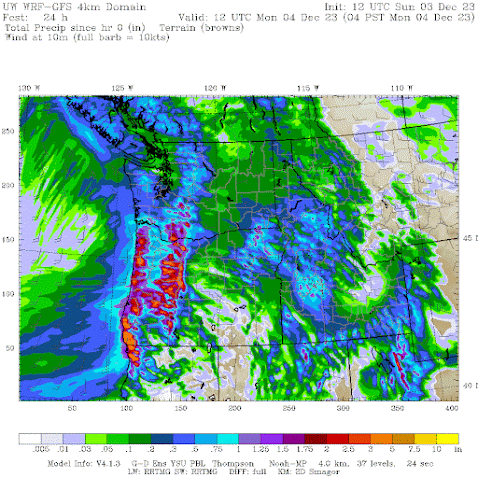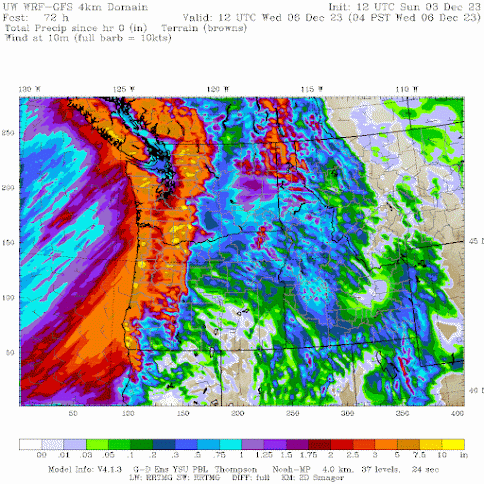If some folks thought that a strong El Nino would protect the region from heavy rain before the new year, they were mistaken.
A substantial atmospheric river-- a narrow current of high-water vapor content-- will be heading right into our region starting Monday evening, and the precipitation amounts will be substantial.
Let me show you.
Below is a forecast map of total water vapor content through a vertical column of the atmosphere at 10 PM Monday. The blues and light pinks indicate the largest values.
Atmospheric rivers like this tap large amounts of water vapor in the tropics and subtropics. Moisture also converges into the "river" from the sides, not unlike the water of small streams flowing into a major river along its path.
Professional meteorologists generally prefer to look at another measure of the potency of atmospheric rivers called integrated water vapor transport (IWVT), which is water vapor content times the wind speed.
It is a measure of how much water vapor is being transported by the wind and is better correlated with rainfall potential.
Here is the IWVT at the same time as the image above (10 PM Monday). Blues indicate large values.
You will note that there is a lot of moisture coming into the Northwest coast, but little extending to the northeast. Where did all the moisture go?
It rained out!
Below is the forecast total precipitation through Monday at 4 AM (start at 4 AM Sunday). Precipitation for the whole region, but heaviest over the Oregon terrain.
Then the atmospheric river comes in (JAWS music should be played now). The total precipitation through 4 AM Tuesday is impressive, with 7-10 inches over the mountains of Washington and SW British Columbia. Most of that atmospheric river moisture is being pulled out of the atmosphere by precipitation over regional terrain.
Do you want to see something very, very impressive? Go to Snoqualmie Falls on Wednesday. You won't believe what you will see.
One thing I can guarantee you. The City of Seattle will be able to bring the water level of its reservoirs way up and there won't be any talk of low water levels. Take a long shower if you like....😔
Considering that we are in a strong El Nino period, which will probably reduce snowpack in the spring, reservoir managers should try to save as much of this water as possible.










So last year was La Nina and California got soaked while we were dry. This year it's El Nino and we're getting soaked while California is dry. Is there really a correlation between ENSO phase and precipitation? I looked back to the 2012-2013 water year (11 periods total - comparing precipitation as % of average and snowfall in inches for Sea-Tac) and could not find one.
ReplyDeleteNext spring and summer could be scary with the heat and lack of rain thanks to El Nino, prepare now and hope for the best.
ReplyDeleteWorrying start of the ski season in BC. Most resorts don't yet have enough snow as is and have delayed opening by 1-2 weeks.
ReplyDeleteThis system has a high chance to wipe out what little snow pack exists. May dodge a bullet in the West/North Columbia, North Purcell and Rockies... But South Purcells, Kootenay-Boundary and Lizard Range are calling for rain to 2500m with 75-100mm forecast over the next few days followed by a drying trend; insane amounts of precipitation in the wrong form for December that will surely keep Silver Star, Big White, Red, Whitewater and Fernie a long ways away from opening.
Wow, this is some intense nonstop rain. At my home on Vashon Island I've measured 2.6 inches in the past 10 hours (8pm - 6am).
ReplyDeleteNot a noteworthy precipitation event for the Bellingham area due to rain shadowing as usual but the tropical/subtropical origin of the moisture was certainly evident with dew point temperatures approaching 60F and a new daily record high temperature at BLI on 12/4.
ReplyDeleteNorth Fork of the Stiily getting record flooding. Water just now receding. It would have been nice if NOAA updated the level meters more than once an hour. The crest of the flood was more than 2 feet higher than the forecast.
ReplyDeleteA river runs through it doesn't sound romantic anymore. Still so far none hurt and nothing destroyed.
I agree that it would be nice if NOAA updated the level more than once an hour.
ReplyDelete